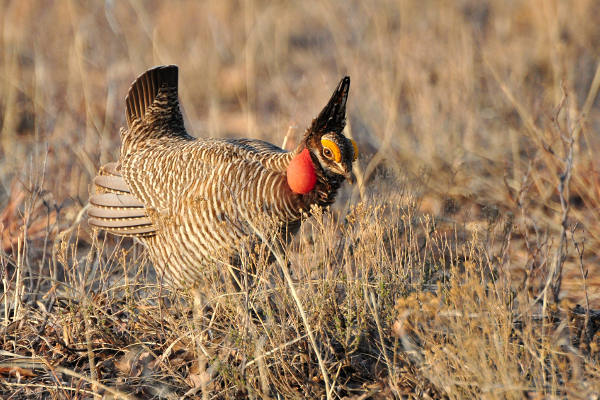
Plan amounts to insurance for a participating landowner against any additional action by the FWS if the Lesser Prairie Chicken is listed.Landowners will work with ODWC biologists and develop a wildlife management plan specific to the property enrolled. Participation in the program is free and landowners may opt out at any time.
February 7, 2013

The recent announcement by the Oklahoma Department of Wildlife Conservation (ODWC) of an agreement reached with the U.S. Fish and Wildlife Service (FWS) to offer landowners options for assurance against additional requirements if the Lesser Prairie Chicken is listed as Endangered or Threatened species should be greeted as welcome news according to Joe Parker, President of the Oklahoma Association of Conservation Districts (OACD).
The agreement, Parker said, amounts to insurance for a participating landowner against any additional action by the FWS if the Lesser Prairie Chicken is listed.
“We’re pleased that U.S. Fish and Wildlife and ODWC were able to negotiate an agreement that offers landowners a path to certainty if the Lesser Prairie Chicken is listed under the Endangered Species Act,” Parker said. “With this action we can provide farmers, ranchers and other landowners the information they need to help them stay out of the regulatory cross-hairs while helping improve the wildlife habitat on their ground.”
The newly created agreement is called the Candidate Conservation Agreement with Assurances Program (CCAA). Landowners who have approved management plans in place with the CCAA before the final listing decision is made on the Lesser Prairie Chicken will have the guarantee of assurances against certain liabilities and federal restrictions in the event that the species is listed as a threatened or endangered species. The CCAA permit is issued to ODWC by the U.S. Fish and Wildlife Service and Wildlife Department will include participating landowners through a Certificate of Inclusion (CI) under the permit. A final ruling on the listing of the Lesser Prairie Chicken is expected at the end of September 2013.
Landowners who enroll in the CCAA program will work with ODWC biologists and develop a wildlife management plan specific to the property enrolled. Plans may include efforts such as red cedar removal, fence marking and grazing management among other conservation improvements. In return, landowners who enroll and participate receive the assurances offered by the permit.
The CCAA is designed to conserve Lesser Prairie Chickens and their habitat while minimizing impacts that a federal listing would have on landowners in the eligible region. This is a voluntary program, and participation is not dependent on the presence or absence of Lesser Prairie Chickens on the enrolled property. Through the program, landowners agree to perform certain habitat work to benefit Lesser Prairie Chickens in exchange for the assurances provided under the Certificate of Inclusion.
Landowners in the following counties are eligible: Alfalfa, Beaver, Beckham, Cimarron, Custer, Dewey, Ellis, Harper, Major, Roger Mills, Texas, Washita, Woods and Woodward. Participation in the program is free and landowners may opt out at any time.
While landowners receive no payment for participating in the CCAA, Parker said they may qualify for other incentives or payments available through the USDA Natural Resource Conservation Service (NRCS) or the OACD Wildlife Credit Program for the work done to comply with the terms of the CCAA.
“It’s extremely important that landowners in the eligible counties sit down and look at this option,” Parker said. “By participating in this program they can have some certainty that there will be no liability that comes with a listing of the Lesser Prairie Chicken and they can undertake good conservation work on their land. We sure encourage our producers to look into this new program.”
For more information, contact one of the following Oklahoma Department of Wildlife Conservation personnel: Doug Schoeling, (405) 301-9945; Alva Gregory, (580) 334-4459; or Matt Fullerton, (580) 571-5820. Producers can also contact their local conservation district or contact OACD at 405-210-8950.
You May Also Like



